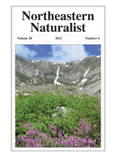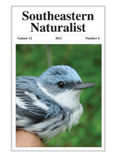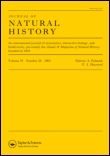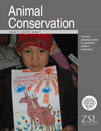
NORTHEASTERN NATURALIST
Scope & Guideline
Advancing Knowledge in Natural History and Biodiversity
Introduction
Aims and Scopes
- Biodiversity and Conservation:
The journal emphasizes research that documents and analyzes the biodiversity of flora and fauna in the Northeastern US, focusing on conservation efforts for rare and endangered species. - Ecological Dynamics:
Studies exploring ecological interactions, species distributions, and the impact of environmental changes are central to the journal's scope, providing insights into ecosystem functionality. - Longitudinal Studies and Monitoring:
The journal frequently publishes longitudinal studies that track changes in ecosystems over time, contributing to a deeper understanding of ecological trends and the effects of human activities. - Methodological Innovations:
Innovative methodologies, such as environmental DNA (eDNA) analysis and remote sensing, are highlighted, showcasing advances in ecological research techniques. - Regional Focus:
Research with a specific focus on the Northeastern US's unique ecosystems, including urban, coastal, and forested habitats, is a core aspect of the journal's contributions.
Trending and Emerging
- Environmental DNA (eDNA) Applications:
The use of eDNA techniques is on the rise, as researchers leverage this non-invasive method for monitoring biodiversity and assessing the presence of elusive species in various habitats. - Urban Ecology:
Research addressing ecological dynamics within urban settings is gaining prominence, highlighting the interactions between wildlife and urban environments, as well as the implications for conservation. - Climate Adaptation Strategies:
There is an increasing focus on studies that explore adaptive management and resilience in the face of climate change, reflecting a shift towards practical conservation solutions. - Microbial Ecology:
Studies investigating the relationships between microbial communities and their environments, particularly in unique ecosystems like saltmarshes, are emerging as a significant area of interest. - Biodiversity Monitoring Techniques:
Innovative monitoring techniques, including remote sensing and citizen science initiatives, are becoming more prevalent, emphasizing community involvement in biodiversity conservation.
Declining or Waning
- Traditional Taxonomy:
There appears to be a decreasing focus on traditional taxonomic studies, which may be attributed to the rise of molecular techniques and a shift towards integrative approaches that combine genetics with ecological data. - Historical Ecology:
Research emphasizing historical ecology and the long-term impacts of past events on current ecosystems is becoming less frequent, possibly overshadowed by immediate conservation concerns and contemporary ecological studies. - Invasive Species Studies:
Although still relevant, the frequency of studies specifically dedicated to invasive species dynamics seems to be waning, as the journal shifts towards broader ecological interactions and conservation strategies. - Agricultural Ecology:
Research focusing on agricultural systems and their ecological impacts is less prominent, indicating a potential shift towards urban ecology and natural habitat restoration themes. - Climate Change Impacts:
While climate change is still a relevant topic, detailed studies on its impacts on specific species or ecosystems have lessened, perhaps due to the increasing focus on adaptive management and resilience strategies.
Similar Journals

Nature Conservation Research
Leading the charge in ecological and environmental research.Nature Conservation Research is a prominent open-access journal that has been dedicated to advancing the field of conservation science since its inception in 2016. Published by the SARANSK FOND PODDERZKI & RAZVITIA ZAPOVEDNYH in the Russian Federation, this journal serves as a vital platform for researchers, professionals, and students alike, providing critical insights into ecological and environmental issues. With an impressive impact factor and ranked in the second quartile across multiple categories—including Agricultural and Biological Sciences, Earth and Planetary Sciences, Ecology, and Nature and Landscape Conservation—Nature Conservation Research stands at the forefront of impactful scientific discourse. The journal not only aims to disseminate high-quality research findings but also seeks to foster collaboration and innovation in conservation practices globally. By ensuring open access to its content, it promotes widespread dissemination of knowledge, crucial in the fight against biodiversity loss and environmental degradation. Researchers and practitioners contributing to the journal will find themselves at the convergence of science and conservation efforts, paving the way for sustainable ecosystem management.

SOUTHEASTERN NATURALIST
Connecting Researchers to the Heart of Southeastern NatureSOUTHEASTERN NATURALIST, published by the esteemed Eagle Hill Institute, serves as a vital resource in the fields of ecology, evolution, behavior, and systematics. With an ISSN of 1528-7092 and an E-ISSN of 1938-5412, this journal has been contributing to scientific discourse since 2002 and continues to provide insight into the intricate dynamics of southeastern ecosystems. While it currently holds a Q4 ranking in its category, the journal is committed to fostering research that advances understanding in its specific regional context, making it a unique platform for scientists interested in biological diversity and conservation issues relevant to the southeastern United States. Although it does not offer open access, researchers and institutions can subscribe to gain full access to cutting-edge research articles and reviews that highlight both multidisciplinary approaches and community-based studies. By bridging local ecological knowledge with broader evolutionary theories, SOUTHEASTERN NATURALIST appeals to a diverse audience, including researchers, conservationists, and students dedicated to ecological integrity and sustainable practices.

Freshwater Crayfish
Advancing Knowledge in Aquatic BiodiversityFreshwater Crayfish, published by the International Association of Astacology, is a peer-reviewed journal dedicated to the comprehensive study of freshwater crayfish, encompassing their ecology, behavior, conservation, and management. With an ISSN of 2076-4324 and an E-ISSN of 2076-4332, this journal serves as an essential platform for researchers, professionals, and students in aquatic science, particularly within the fields of Ecology, Evolution, Behavior and Systematics and Aquatic Science, where it ranks notably in Scopus rankings. The journal has a consistent publication history since 2008, enhancing its relevance and contribution to the scientific community. While it operates under an open-access model, allowing for wide dissemination of research findings, it is particularly noted for its significant impact on advancing knowledge in the preservation and sustainable management of crayfish species. This makes Freshwater Crayfish a vital resource for those passionate about aquatic biodiversity and conservation.

Global Ecology and Conservation
Pioneering research in the heart of conservation efforts.Global Ecology and Conservation, published by Elsevier, stands as a premier open-access journal dedicated to advancing the field of ecology and conservation science. Since its inception in 2014, the journal has facilitated the dissemination of high-quality research, fostering critical dialogue on ecosystem management, biodiversity preservation, and sustainability practices across the globe. With a remarkable ranking within the top quartiles (Q1) in various categories including Ecology, Evolution, Behavior and Systematics, and Nature and Landscape Conservation, it is positioned among the leading resources for researchers and professionals alike. The journal has garnered a notable impact, ranking #65 out of 721 in Ecology, and houses articles that are vital to understanding and addressing the pressing environmental challenges of our time. Available in an open-access format, researchers can freely access and share vital findings, promoting a collaborative approach to ecological research. Global Ecology and Conservation is not just a publication; it is a critical tool for innovation and advocacy in conservation, poised to inspire the next generation of environmental stewards.

PRESLIA
Connecting Researchers, Cultivating IdeasPRESLIA, published by the Czech Botanical Society, is an esteemed academic journal that has been contributing to the fields of Ecology and Plant Science since its inception in 1979. With an impressive Q1 ranking in both categories for 2023, it stands out among its peers as a vital resource for researchers, professionals, and students alike. The journal is dedicated to disseminating high-quality research that advances our understanding of botanical sciences, encompassing a diverse array of topics from plant ecology to conservation strategies. With a ranking of #110 out of 516 in Plant Science and #103 out of 461 in Ecology on Scopus, PRESLIA consistently maintains a high impact, reflecting its crucial role in shaping contemporary scientific discourse. While traditional access options are available, the journal's commitment to fostering academic collaboration makes it a key player in the global scientific community. Located in Prague, Czech Republic, PRESLIA continues to bridge gaps in research and offers a platform for innovative scholarly communication up until 2024 and beyond.

Ecologies
Unveiling the complexities of nature for a thriving planet.Ecologies is a dynamic open-access journal published by MDPI, based in Switzerland, which focuses on the interdisciplinary study of ecological and environmental sciences. Since its inception in 2020, the journal has made significant strides in contributing to our understanding of complex ecological interactions, evolutionary processes, and the implications of biological diversity on ecosystem functionality. With its categorization in Q2 for Ecology and various Q3 rankings in related fields, it proudly offers a platform for innovative research that aims to address pressing ecological challenges. Researchers, professionals, and students can benefit from its comprehensive and insightful articles that are freely accessible, ensuring that critical findings are disseminated widely to facilitate informed decision-making and foster collaboration across disciplines. With the impact of climate change and biodiversity loss at the forefront of global discussions, Ecologies plays a pivotal role in shaping the future of ecological research and policy implementation.

North-Western Journal of Zoology
Bridging Knowledge Gaps in Zoological StudiesNorth-Western Journal of Zoology is a prominent scholarly publication dedicated to the field of zoology, fostering a vibrant exchange of research findings and insights among scientists, professionals, and students. Published by UNIV ORADEA PUBL HOUSE in Romania, this journal has been a reliable source for advancing knowledge in Animal Science and Zoology since its inception in 2008, with its publications spanning until 2024. With an engaging focus on innovative research and review articles, the journal proudly holds a Q3 quartile ranking in its category for 2023, positioning itself within the competitive landscape of Scopus Ranks. Although currently lacking an open-access model, the journal provides a valuable platform for disseminating critical findings essential to understanding animal biology and ecology. Researchers contributing to this journal benefit from a dedicated readership, furthering the discussion and practical applications of their work in diverse contexts.

JOURNAL OF NATURAL HISTORY
Fostering Innovation in Ecological ResearchThe Journal of Natural History, established in 1967, is a pivotal academic resource published by Taylor & Francis Ltd. With an ISSN of 0022-2933 and an E-ISSN of 1464-5262, this journal is a cornerstone in the field of Ecology, Evolution, Behavior, and Systematics. Ranked Q2 in its category as of 2023, it stands out with a Scopus ranking of #477 out of 721, reflecting its influence and relevance, particularly in the agricultural and biological sciences. The Journal of Natural History aims to disseminate high-quality, peer-reviewed research that contributes to our understanding of biodiversity and ecosystem dynamics. Although it does not operate under an open-access model, this journal remains accessible through various academic libraries and platforms, making it an essential resource for researchers, professionals, and students striving to advance their knowledge in natural history. With its long-standing commitment to excellence, the journal plays a crucial role in shaping discourse and fostering innovation in ecological research.

ANIMAL CONSERVATION
Innovating Conservation Strategies for Wildlife and Habitats.Animal Conservation is a prestigious journal that serves as a vital platform for the dissemination of research dedicated to the preservation of wildlife and habitats. Published by Wiley, this journal has established a significant presence in the fields of Ecology and Nature and Landscape Conservation, holding a distinguished Q1 category ranking for both in 2023. With an impressive Scopus rank of #25 in the realm of environmental science, it caters to a global audience keen on understanding and addressing pressing conservation issues. The journal provides researchers, professionals, and students with high-quality, peer-reviewed articles that explore innovative methods and strategies in animal conservation. With its continuous publication since 1998, encompassing a comprehensive range of topics, Animal Conservation is indispensable for anyone aiming to make impactful contributions to the field of ecology and conservation biology.

ACTA OECOLOGICA-INTERNATIONAL JOURNAL OF ECOLOGY
Illuminating Pathways to Sustainable SolutionsACTA OECOLOGICA-INTERNATIONAL JOURNAL OF ECOLOGY, published by Elsevier, stands as a prominent platform for disseminating innovative research in the diverse field of ecology. Operating since 1983 and continuing to make significant contributions into 2024, this journal features critical studies that advance our understanding of ecological systems, behaviors, and conservation efforts. With an impressive Q2 ranking in both the ecology and nature conservation categories, it exemplifies high-quality scholarship, reflected in its Scopus rankings—#74 in Environmental Science and #254 in Agricultural and Biological Sciences. Researchers, professionals, and students in the field are invited to explore the latest findings and methodologies that address pivotal ecological issues. As a journal committed to fostering academic collaboration, ACTA OECOLOGICA is essential for anyone dedicated to enhancing their comprehension of ecological dynamics and advancing sustainability practices globally.